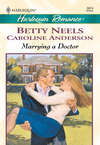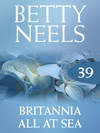Loe raamatut: «The Edge of Winter»
“You’re extremely rude! I was actually beginning to like you.
“But I see now that you’re exactly the same as you were when we met….”
“Do tell me.” He sounded amused and not in the least repentant.
“Bad tempered and impatient and laughing at me.” She drank the rest of her coffee and said in a small, polite voice, “Thank you for my lunch,” and put out a hand to pick up her purse, but his own large hand came down, very gently, onto hers.
“I’m all those things, and more,” he told her quietly, “but could you not like me a little despite them?”
She sat looking at his hand. It felt cool and strong, cherishing hers in its grasp—the hand of someone who would help her if ever she needed it. She said uncertainly, “I don’t understand you, or know anything about you, but I do like you.”
The hand tightened just a little. “Good,” said the doctor.
About the Author
Romance readers around the world were sad to note the passing of BETTY NEELS in June 2001. Her career spanned thirty years, and she continued to write into her ninetieth year. To her millions of fans, Betty epitomized the romance writer, and yet she began writing almost by accident. She had retired from nursing, but her inquiring mind still sought stimulation. Her new career was born when she heard a lady in her local library bemoaning the lack of good romance novels. Betty’s first book, Sister Peters in Amsterdam, was published in 1969, and she eventually completed 134 books. Her novels offer a reassuring warmth that was very much a part of her own personality. She was a wonderful writer, and she will be greatly missed. Her spirit and genuine talent will live on in all her stories.
The Edge of Winter
Betty Neels

CONTENTS
CHAPTER ONE
CHAPTER TWO
CHAPTER THREE
CHAPTER FOUR
CHAPTER FIVE
CHAPTER SIX
CHAPTER SEVEN
CHAPTER EIGHT
CHAPTER NINE
CHAPTER ONE
THE little town was small and snug, tucked in between the Cornish hills and cliffs, and the late afternoon sun shone on its slate roofs and brightened the whitewashed walls of the cottages clustered round its small harbour, although there was a chilly wind blowing in from the sea. It was not yet five o’clock, but the October afternoon was already drawing in, and the girl climbing the path from the harbour towards the car park at the side shivered a little as she paused to look back before she rounded the corner, to thread her way through the few cars there and then follow the cliff path.
It was a little late for a walk, she reflected, but she had been playing backgammon with her father all the afternoon, sitting in the lounge of the Lobster Pot Hotel, and she had stolen frequent glances out of the old-fashioned bow window overlooking the harbour and felt envy of the intrepid yachtsmen gowling briskly out to the open sea. It would have been nice to have gone sailing, but although several of the younger men staying in the little town had scraped the beginnings of an acquaintance with her, it had come to nothing; her father and aunt had absorbed all her leisure, and quite unwittingly; they were darlings and she loved them devotedly, but they tended to forget that she was all of twenty-five with a responsible job, a life of her own, and well able to take care of herself.
She turned her back on the harbour, left the car park behind and took the path along the cliff top. Round the next great headland of grey rock was Falmouth, but it might have been a hundred miles away, for there was nothing to see but the rough grass around her and the sea below. She stopped again to watch the gulls wheeling in from the sea; the wind was freshening, but despite this there were still two or three sailing boats out to sea and she sat down for a moment on a tussock of coarse grass the better to watch them, pulling the high neck of her sweater closer and retying her long honey-coloured hair. She was a pretty girl, with large dark blue eyes fringed with honey-coloured lashes which she didn’t darken and a straight little nose above a generous mouth; her long legs were encased in old slacks and when she stood up she showed herself to be a little above middle height and slim without being skinny.
The path was a narrow one, sometimes running close to the cliff edge so that she had a clear view of the sea surging amongst the rocks below, sometimes turning inland between trees and shrubs. She walked briskly, her thoughts busy. Tomorrow she would be leaving Cornwall and returning to London; to St Katherine’s, where she was the Accident Room Sister, and in a way, she reflected, she wouldn’t mind going back. She loved her father and Aunt Martha dearly, but they were elderly now, content to sit with a book or play cards and take a daily walk along the harbour, activities which weren’t enough for her own youthful energy. But the week of doing almost nothing had done her good; she felt rested and relaxed, ready to tackle a hard day’s work, and besides, there was another week’s holiday to look forward to—just before Christmas, when she would go home to the pleasant little house in its small, well kept garden, tucked tidily into one of the narrow side streets of the Somerset village where she had been born and brought up. It was delightful once the summer tourists had gone, with its wide main street and Dunster Castle towering over it, and if she felt like it, she could walk down to the water to catch a glimpse of Wales on the other side of it, and if that wasn’t enough, there was always Minehead a mile or so away.
The path had found its way back to the edge of the cliff once more and she slowed her pace to watch the clouds bunched angrily on the horizon. It would rain, but not yet. She had time to walk back to the hotel without fear of getting wet, and the faint sea mist beginning to creep up didn’t worry her either; she had walked the path almost daily and knew it well enough.
She was on the point of turning back when her eye caught something moving far below her—something white. There was someone there, waving, and leaning precariously over the cliff face, she could hear a faint treble shout. She looked carefully round her; there was no boat within miles and certainly no other human being, and right before was an apology of a path, trickling out of sight down the rough cliff face. Someone had apparently gone down that way and was unable to get back. She could, of course, go back to the town and get help, but that would take too long; it would be dark by then and almost certainly raining. Whoever it was down there was unable to walk or climb and they would get soaked and cold. If she went down now, she and the unfortunate below would be back on the cliff top within fifteen minutes or so, and if they were injured and couldn’t climb—well, all the more reason for her to go down and see what could be done.
The path was steep but perfectly safe, and she didn’t find it too difficult; heights didn’t bother her and she was surefooted enough. She was halfway down when she saw that it was a child on the little patch of sand between the sharp spines of rock, and she quickened her pace, for the child wasn’t moving.
It was a girl, a little girl of eight or so, with a small face puffed and red with tears and one leg bent awkwardly beneath her. She was wearing shorts and it was her T-shirt which she had been waving.
She said at once in a hoarse little voice: ‘I thought no one would ever come—what’s your name?’
‘Araminta Shaw—what’s yours?’ Araminta recognised that an exchange of names spelled security for the child, and smiled cheerfully at her.
‘I’m Mary Rose Jenkins and I’ve hurt my leg—I fell…’ She burst into tears, and Araminta sat down beside her and hugged her close and let her cry. Presently she wailed: ‘I can’t move it—I tried, but it hurts. What shall we do?’ She looked round with an anxious face. ‘It’s getting dark.’
‘Not yet, it’s not,’ said Araminta, and eyed the telltale bump, already discoloured, just above the child’s thin ankle. A Pott’s fracture, and how on earth was she going to find anything to splint it, and even if she found it, how were they going to get up the cliff again? Piggyback, if the child could bear the pain and she herself could manage the path with the uncertain weight of the child on her shoulders; she would tackle that problem when she came to it. Now she said cheerfully: ‘Let’s put that shirt back on, and then I’m going to do something about that leg of yours. You see, we must get it straight, poppet, before we climb back up that cliff path. I shall hurt you, I’m afraid, but you’re a brave girl, aren’t you?’
She dropped a kiss on the tangled brown hair, slid the shirt back on and studied their surroundings; surely there would be some wood lying around; an old box, a broken spar, even some cardboard. There was always flotsam and jetsam on the sea shore. ‘Look, Mary Rose,’ she explained, ‘I want to find a piece of wood to tie to your leg—it won’t hurt nearly as much then. Will you be OK while I look round? I won’t go far.’
There was nothing, absolutely nothing at all. She went back to where the child waited so patiently and sat down beside her and took off the knee socks she was wearing under her slacks; they were by no means ideal, but she could tie the little girl’s legs together, using the sound leg as a splint. She told Mary Rose what she was going to do, begged her to keep as still as she could, and bent to her task. In hospital, she reflected, with everything to hand, the fracture could have been reduced and the leg put in plaster with the child happily unconscious under anaesthetic; now all she dared to do was to lift the little broken leg gently until it was beside its fellow and tie her socks above and below the fracture. Mary Rose screamed all the while she was doing it, but she had to shut her ears to that; all she could do when she had finished was to hold the child close and soothe her, and presently, as the pain dulled a little, Mary Rose dozed off.
Araminta sat awkwardly, the child’s small body pressed close to hers, while she debated what to do next. To go up the cliff path was going to be so difficult that it would be almost impossible; but to stay there all night was impossible too, an opinion borne out by the first few drops of rain. They became a downpour within minutes, and the wind, still freshening, sent scuds of spray on to the small stretch of sand. Really, thought Araminta, it couldn’t be worse. There was no shelter, and Mary Rose had wakened and was voicing her displeasure in no uncertain manner. Araminta, who didn’t quail easily, quailed now. ‘This,’ she declared strongly, ‘is the utter end!’
Only it wasn’t; a yacht was coming round the next headland, still some way off, but at least sailing in their direction. She waved, wishing she had something colourful which the people on board might see more easily in the deepening gloom, told Mary Rose the good news, laid her down carefully and then went right to the water’s edge and waved again. The yacht turned a little away from them, out to sea, giving the rocky coast a wide berth; probably those on board hadn’t even seen her. But she went on waving even though her arms ached; she shouted too, quite uselessly, but it made her feel better. When the yacht turned again, inland this time, she hardly dared to hope that she had been seen. She watched anxiously to see what would happen next and shouted with delight when its slender nose was pointed towards land. She waved again and then went to reassure Mary Rose, who had rolled over on to her bad leg and was screaming with pain. Araminta bent over the child, doing the best she could, and when she straightened, it was to see a rubber dinghy nosing its way slowly through the treacherous water between the outcrops of rock. She ran down to the water again, peering through the driving rain, and splashed into the surf, already so wet that she hardly noticed the water round her ankles.
‘Oh, what a blessing!’ she cried happily. ‘I’ve never been so glad to see anyone in my life—I thought we’d be stuck here…’
The occupant of the dinghy cut its motor, pulled it half out of the water and stood up. He was a big, heavily built man and very tall, with dark hair greying at the temples; his hawklike good looks wore a look of extreme ill-humour as he stood looking down at her. He was just as wet as she was, his thick sweater heavy with rain and sea water, his slacks sopping. He said harshly: ‘You silly little fool—don’t you know that these cliffs are dangerous?’ He caught sight of Mary Rose. ‘And what’s that?’
Araminta eyed him with disfavour; he might have come to their rescue, but he didn’t need to be quite so nasty about it. She said snappily:
‘That is a little girl—she’s broken her leg, I certainly shouldn’t have waved to you otherwise; I’m perfectly capable of climbing the cliff path.’
He smiled nastily. ‘My dear good woman, I’m not in the least interested in your climbing prowess. How do you know the child’s leg is broken?’ He was by Mary Rose’s side now, sitting on his heels, not touching anything, just looking. ‘A Pott’s,’ he murmured, and Araminta said in a surprised voice: ‘Yes, it is—how did you know?’
‘I’m a doctor,’ he answered her blandly as he gently undid the socks, ‘and how did you know?’
‘I’m a nurse.’
‘You surprise me.’ He ignored her gasp of annoyance, and bent to see the extent of the damage. He retied the socks presently, saying coolly: ‘Well, at least you had the sense to leave it alone. I’ll get her on board and put in at Mousehole. She can go to Falmouth by ambulance.’
‘Can’t you sail back to Falmouth?’ Araminta wanted to know. ‘It’s quite close…’ He gave her a withering look. ‘The wind,’ he explained with a frosty patience which set her teeth on edge. ‘We should have to sail into it and it would take twice as long.’ He bent over the child again and his dark face was lighted by a smile now. ‘We’re all going back home in my boat,’ he told her. ‘Once we are there we’ll get that leg seen to.’ He touched Mary Rose’s brown hair with a gentle finger. ‘What a brave little girl you are!’ He stood up and looked out to sea to where the yacht was anchored. ‘Get into the dinghy,’ he ordered Araminta, ‘and sit down. I’ll put the child in your lap.’
She did as she was told, seething silently. Now was hardly the time to tell someone—someone who was rescuing them from an unpleasant situation—that she considered him to be the rudest man she had ever encountered. She cuddled the little girl close during the short journey, and only when they reached the yacht did she wonder how on earth they were to get on board.
She need not have worried; there was someone waiting for them, a grey-haired, thick-set elderly man with powerful arms, who reached over the boat’s side and lifted Mary Rose as though she had been a feather and disappeared below with her. Araminta watched the yacht dancing in the choppy sea and wondered what she was supposed to do. ‘Hold the rail,’ her companion advised her, ‘and pull yourself aboard—it’s quite easy. Wait until I say so.’
It didn’t look in the least easy, but she was beyond worrying about it; when he said ‘Right,’ she pulled herself up and helped by an unexpected boost from behind, landed untidily on the yacht’s deck. It didn’t help at all to see the man spring lightly on deck beside her without any effort at all and proceed to tie up the dinghy. ‘Go below,’ he said over his shoulder. And she went.
It was warm and snug in the cabin. Mary Rose was on a padded couch along one wall and the elderly man was pouring tea into four mugs. He looked up as their rescuer joined them and spoke in a language Araminta couldn’t understand, and when he nodded, fetched a bottle and poured some of its contents into the mugs. ‘Brandy,’ said the dark man, ‘and get those wet clothes off—and the child’s, too.’ He went to a locker and pulled out a couple of sweaters and some blankets.
‘Use these.’
Araminta didn’t say anything; not because she could think of nothing to say; there was a great deal she was storing up for a more suitable occasion—besides, her teeth were chattering too hard to make speech effective. She gave Mary Rose some of the hot tea and drank her own. The brandy sent a warm glow through her and she was on the point of remonstrating with their unwilling host when he urged the child to drink the rest of her tea, but he forestalled her with a quiet: ‘Yes, I know what you’re about to say, but we have an hour’s sailing before us and the sea’s choppy—she needs to sleep.’
He swallowed his own tea, spoke to the older man and went on deck, to be followed at once by his companion.
Araminta began to undress Mary Rose—luckily there was almost nothing to take off; the sweater was far too large, but it was warm and enveloped the child completely. She wrapped a blanket round her and saw with relief that she was already half asleep.
It didn’t take her more than a moment to tear off her own sweater and put on the one she had been given. She was forced to turn up its sleeves to half their length, and it was so long that she debated whether to take off her slacks as well, but she decided against that; she wouldn’t look dignified, and she wanted to be that at all costs. She settled for damp slacks and her dignity, plaited her damp hair and longed for a mirror. The yacht was moving now, and just as its owner had said, the sea was choppy; she supposed it was the brandy which made her feel so unconcerned about it.
Mary Rose was deeply asleep now and likely to remain so, what with fright and pain and brandy. Araminta pulled up a stool and sat by the couch, one arm over the child, and looked about her. She knew very little about yachts, but this one struck her as extremely comfortable; its furnishings were simple, but there was no lack of comfort. She fell to wondering who the owner might be and why he had spoken in a foreign tongue to the other man. She frowned a little; he had spoken fluent English to her, but now that she thought about it, there had been the faintest accent. The object of her thoughts came back at that moment, walking through the cabin without a word, to enter a cubby-hole at its end which presumably held radio equipment, for she could hear his voice speaking to someone, but when he came back it was obvious to her from his aloof expression that he had no intention of telling her anything. He said nothing, only opened a cupboard in the wall, took out a packet of sandwiches and laid them on the table beside her.
Araminta ate two of them, for she was peckish. The walk had sharpened her appetite and then there had been the climb down the cliffs and some considerable time waiting beside the child. The sandwiches were excellent—smoked salmon and very fresh brown bread; she eyed the rest of them hungrily as she wrapped them up again, but Mary Rose might wake and feel hungry too. But she didn’t; not once during the rest of the rather unpleasant hour did she stir, and a good thing too, thought Araminta, for the sea was now quite rough and the wind had veered, slowing their progress. The elderly man had come below briefly to give her another mug of coffee and ask her, in his peculiar English, if she needed anything and was the little girl all right. She accepted the coffee gratefully, not moving from her stool, and wondered as she drank it if anyone had missed the child yet. Surely by now—she glanced at the clock and saw to her astonishment that it was almost half past eight; they must have been on the beach much longer than she had thought. Her father and Aunt Martha would certainly be wondering where she was, and Mary Rose’s parents would be frantic… Her thoughts were interrupted once more by the dark man, who stayed just long enough to tell her that they would be entering the harbour within the next few minutes. He disappeared as quickly as he had come.
She knew almost nothing about sailing, but it seemed to her that the yacht was berthed very smoothly and in a few minutes both men came into the cabin; when the boat’s owner bent to pick the little girl up, Araminta observed urgently: ‘She’s very sound asleep. She’s all right, isn’t she?’
His severe expression softened into a brief smile. ‘She’s a very little girl and she’s had a lot of brandy.’
There was nothing she could answer to that; she picked up their damp clothes and followed him up on deck. It was raining still and very dark, and there was no sign of the wind easing. There were a few lights here and there, shining through the curtain of rain, but no one about. The three of them made their way silently down the small harbour’s arm and on to the quayside, the little girl cradled in the dark man’s arms, Araminta close at his heels and behind her the elderly man, walking stolidly into the rain.
Araminta skipped a step or two and caught up with the leader of the party. ‘Where are we going?’
‘A pub—somewhere where there are people who will know whose child this is and where we can telephone.’
‘There’s the Lobster Pot just along here.’ She waved into the dimly lighted narrow street ahead of them, which ran round the harbour. ‘They’re…’
‘I know—I’ve been here before.’
‘How rude,’ said Araminta severely, and went past him to open the hotel door. It was in the side wall of the hotel and led straight into the downstairs bar. There were quite a number of people in it, among them her father and aunt, in deep discussion with the hotel’s owner, but they paused in mid-sentence when they saw her and her companions, and Aunt Martha, a formidable-looking lady with severe features and a well-disciplined hair style, made her way briskly through the throng around her and demanded briskly: ‘Araminta, where have you been? We’ve been very worried—and who are these people?’
Her sharp eyes took in the child in the man’s arms and his companion and then returned to her bedraggled niece.
‘Sorry you were worried, Aunt,’ said Araminta, knowing that under the rather fierce exterior was a very nice old lady who loved her. ‘I found this little girl, and these gentlemen very kindly picked us up in their yacht and brought us back. The child’s leg is broken and this gentleman is a doctor, so if…’ she paused and looked at him, standing silently beside her. ‘If you would say what you want us to do?’ she asked him. ‘A room with a firm table—something I can use for splints, and someone to telephone for an ambulance to take the child to hospital and to discover to whom she belongs.’
It was like being back at St Katherine’s, carrying out a consultant’s orders without waste of time. ‘There’s an office behind the reception desk, I’m sure the owner…’ She was already there, asking for its use and if someone would see about the ambulance. ‘Two sticks,’ she reminded herself aloud and heard the man chuckle; worse, he followed it with a: ‘You’ve more sense than I imagined.’ He spoke in a faintly mocking voice which made her grit her splendid teeth. But it was no time to consider her own feelings, so she pushed the table into a better position and went to fetch the variety of sticks offered as well as a splendid collection of scarves, ties and napkins to tie them with. She chose the most suitable of them, smiled briefly at her father, standing quietly in a corner, and went back to where Mary Rose, still mercifully tipsy, lay.
She admitted to herself later that the child’s bony little leg had been expertly splinted, the ends of the bone brought into alignment before the splints were put on; probably they were in as good a position as they needed to be before the plaster was applied. It was a pity she would never know that; Mary Rose had been whisked off to Falmouth in the ambulance and the dark man had gone with her, while his companion had gone back to the yacht. Both men had said goodbye to her, the elder with grave courtesy, the younger with a curt brevity which allowed her to see that he couldn’t care less if he never saw her again.
She went to bed much later, having repeated her story a great many times for the benefit of her father and aunt, the owner of the hotel and most of the guests staying at the hotel. The police had come too, bringing with them a distraught young woman who had slipped out to the shops, thinking it was safe to leave her small daughter alone for a little while. Araminta answered the police-man’s questions, accepted the woman’s thanks awkwardly and asked if the child was safely in hospital. The police sergeant said that yes, she was, with the leg nicely plastered, and that the gentleman who had been such a help us there too. Possibly, he added, Araminta herself would see him on the following day, for he would be returning to his yacht.
But in the morning there was no sign of him, although the yacht was still in the harbour. Araminta, put out for no good reason, dressed in her well-cut tweed suit, put her shining hair up in a neat coil on the top of her pretty head, got into her elderly Mini and began the drive back to London. Her father and aunt saw her off. Her father, as usual, had very little to say beyond wishing her a good journey and not too much work. It was Aunt Martha who said in her measured tones:
‘That was an interesting man who brought you back yesterday. A pity you won’t see him again, my dear.’
Araminta put a stylishly shod foot down on the accelerator. ‘He was the rudest man I’ve ever met,’ she pronounced coldly. ‘The only pity is that I shan’t see him to tell him so.’
Tasuta katkend on lõppenud.




















